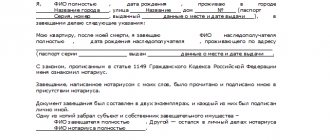Sample will for an apartment
As a rule, the subject of disputes after the death of a relative becomes his most valuable property - real estate. In order to avoid family squabbles and legal proceedings, the property owner should determine in advance whose ownership the real estate should go. The owner can legitimize his will by drawing up a will.
- Making a decision on the transfer of property into the ownership of selected persons - heirs, selection of heirs, distribution of property between them;
- Preparation of documents;
- Drawing up a written document (on your own or with the help of a notary), signing personally by the testator and notarization.
What is a will?
A will is a written and notarized document that contains a direct and unambiguous procedure for the transfer of property into the ownership of the heirs, the procedure for the use and disposal of property. The subject of a will can be any property - a house or apartment, vehicles, cash savings.
Expert opinion
Semyon Frolov
Lawyer. 7 years of experience. Specialization: family, inheritance, housing law.
A will is a one-sided transaction . This means that the only party to the transaction is the owner of the property - the testator. The testator himself decides to whom to leave the property: any person, regardless of family ties, age, citizenship, place of residence, can be an heir and will receive ownership of the property after the death of the testator (Article 1119 of the Civil Code of the Russian Federation). The testator himself can set conditions according to which the property will become the property of the heirs (for example, equal or unequal distribution of shares, testamentary refusal, sub-appointment of heirs), he can also change or cancel these conditions. A testator can draw up an unlimited number of wills , and each new one will cancel the previous one (Article 1120 of the Civil Code of the Russian Federation).
Any adult and capable citizen can make a will. At the time of drawing up the document, he must be in a clear mind, aware of the meaning of his own actions, and not experience coercion from other persons.
Sample will for an apartment
The testator can distribute his property into specific parts for each heir or list them in a general list. Based on this, each of them will receive the specified or the same share. At the same time, only that part of the property that belongs to the client according to the certificate of ownership can be unsubscribed. When filling out the form, it should be indicated that from the testator’s share, which is 1/2 (1/3, 1/4) of such and such living space, such and such a portion is allocated to this or that entity.
If the legal capacity of the person being transferred is confirmed, the notary begins to perform legal actions. At the request of the testator, he draws up his will on paper and provides him with a sample for review. If the applicant has vision problems, the text is read out loud. In this case, independent witnesses who are not heirs are involved.
Sample will for an apartment
Example. Citizen N. issued an order for his nephew. However, he did not provide the young man with information about the document. After the death of the testator, his children found a declaration of will in his documents. To avoid being disinherited, they decided to keep silent and threw him out. The nephew did not find out about the existence of a will and was unable to inherit.
- Determine the list of property and composition of heirs.
- Contact a notary office.
- Provide the text of the document or use a notary’s sample as a basis.
- Pay the state fee.
- Study the text of the will.
- Sign and pick up the administrative document.
- Transfer the order to a potential heir.
Joint will of spouses
Along with an ordinary will, from June 1, 2021, the concept of a “joint will of spouses” appeared. Starting from this date, the husband and wife can draw up a joint declaration of will in the event of their death. For example, if one of them dies. Or in case of death of both spouses (anything can happen). The main purpose of such a will is to resolve property disputes and designate heirs.
Spouses can bequeath not only common property, but also personal property. You can choose anyone from among the heirs - children, sisters, nephews, grandmothers and even third parties. Roughly speaking, the spouses come to a common opinion and say - we want to leave the apartment to such and such heirs, but such and such do not lay claim to it. The notary listens to their wishes and then draws up a joint will. Both spouses put their signatures on it, and the notary certifies the deed with a seal - and this ends the procedure for drawing up a joint will. The only documents you will need are passports and marriage certificates.
If the marriage breaks up, the joint will is revoked. Amendments or cancellation of a will occurs with the consent of both spouses . Conventionally, if the wife wants to correct the text of the will, she needs to contact the same notary. But before making changes, the notary will notify the second spouse. This excludes “acting behind the husband’s back”, and vice versa. However, the spouse has the right to draw up his own will, and then the joint will will be canceled (Article 1118 of the Civil Code of the Russian Federation).
The form and content of the joint will of the spouses do not differ from the usual one.
Expert opinion
Semyon Frolov
Lawyer. 7 years of experience. Specialization: family, inheritance, housing law.
Question:
Hello! If I draw up a will myself on a form from the Internet, can the notary demand more money, in addition to 100 rubles for certification of the signature (a will for the apartment where we live with our son, joint ownership)?
Lawyer's response:
Good afternoon.
According to Art. 1124 of the Civil Code of the Russian Federation, any will is drawn up in writing and must be certified by a notary. However, a notary is far from the only specialist who certifies wills. Instead, the will can be signed by the head of an administration or rural settlement, the head of a prison, an expedition, the commander of a ship or a military unit. The service is free, while notaries charge a state fee for certifying wills .
If you want to print the form on the Internet and fill it out in person, there is nothing wrong (better together with a lawyer). Notaries really don’t like it when people come to them with “handwritten” documents. Very often, such wills contain errors, inaccuracies, unnecessary references to articles, etc. However, the refusal has no basis. The law does not prohibit drawing up a will in your own hand and then having it certified by a notary. The only question is the competence of the notary. If he refuses, contact another notary (fortunately there are many of them). If he refuses, you can take an official refusal - and then appeal the notary’s actions to the Notary Chamber, the prosecutor’s office or the district court - by virtue of Art. 49 “Fundamentals of notaries.”
Thus, a will for an apartment is a person’s written expression of will about the fate of his property after death. The document describes possible developments. It is drawn up personally by the testator or under dictation to a notary. Kept in the archives until the inheritance is opened. A will without a notary's signature and seal has no legal force. Spouses can draw up a joint will - one for both.
A will is chosen by those who want to decide the fate of their property in the event of death.
Therefore, you need to approach filling it out with all responsibility. Errors, blots, and inaccuracies in wording are corrected by a notary. But before you go to it, you need to figure out the content (text). It is best to contact a lawyer and get advice. Tell the lawyer your wishes, concerns, doubts... The specialist will tell you how to distribute the apartment among the heirs. Very often housing has to be divided into shares. Sometimes, instead of a will, it is appropriate to draw up a gift deed. Each situation is individual - you need to take into account relationships with relatives, encumbrances on the apartment, the debts of the testator, the legal capacity of the heirs, etc. A lawyer will make this task easier for you and give you up-to-date advice! Attention!
- Due to frequent changes in legislation, information sometimes becomes outdated faster than we can update it on the website.
- All cases are very individual and depend on many factors. Basic information does not guarantee a solution to your specific problems.
That's why FREE expert consultants work for you around the clock!
- via the form (below), or via online chat
- Call the hotline:
- Moscow and the Region
- St. Petersburg and region
- FREE for a lawyer!
By submitting data you agree to the Consent to PD Processing, PD Processing Policy and User Agreement.
Anonymously
Information about you will not be disclosed
Fast
Fill out the form and a lawyer will contact you within 5 minutes
Tell your friends
Rate ( 2 ratings, average: 5.00 out of 5)
Author of the article
Irina Garmash
Family law consultant.
Author's rating
Articles written
612
How to draw up a will for an apartment
There is no single answer to the question about the cost of registering a will. The reason for this lies in the fact that when contacting a notary, a citizen pays a state fee and the notary’s consulting services. If everything is clear with the first point - 100 rubles. (Article 333.24 of the Tax Code of the Russian Federation), then each notary sets the amount of payment for his services himself. The price partly depends on the region, the level of the notary, and the duration of the work. On average, the cost is from 1,000 rubles. up to 5,000 rub. But it can also be higher.
- Decide what property, to whom and in what volume you want to transfer.
- Prepare a draft will. We recommend living wills to make the key principles easier to understand.
- Decide on the form of the will: standard or closed. The second option involves having the will certified by a notary without familiarizing yourself with its contents.
- Formatting the text. You can use a computer to do this, but the signature on each copy of the will must be original. In total, two copies will be required: one for the notary, the second is returned to the testator after certification.
- Contact a notary. During the work, the notary will study the presented text, tell you how to draw up a will for an apartment (), and correct errors. In one option, the notary does not study the text if you are drawing up a closed will.
We recommend reading: How to Find Out Who is Registered in an Apartment by Address
Procedure
The testator can contact any notary office, but it is advisable to draw up the will at the place of residence - this will simplify the matter for the heirs.
First of all, the notary establishes the identity and makes sure of the testator’s legal capacity.
Then the text of the will is prepared - it can be handwritten by the testator himself , or it can be dictated to a notary and typed using printing technology. The finished text is carefully read by the testator. If inaccuracies are found or additions are required, amendments are made to the text.
The document is then signed personally by the testator. If the testator is sick or suffers from physical disabilities that do not allow him to sign on his own, he can use the service of a hand applicator (Clause 3 of Article 1125 of the Civil Code of the Russian Federation).
After this, the notary puts a certification inscription, signs and seals the document. Data about the document is entered into a special register. The document is drawn up in two copies: one is given to the testator, the second is kept in the notary’s office.
The testator pays a state fee of 100 rubles for certification of the document and additional notary services (clause 13, clause 1, article 333.24 of the Tax Code of the Russian Federation).
For more information about a will and the procedure for drawing it up, read the article “How to correctly draw up a will for an inheritance.”
Sample will for an apartment for 2019
When inheriting an apartment in 2021, it is best to write the text of the document not at home, but in the notary office at the address of residence. The cost of the procedure is from 100 to 1000 rubles, the price list is assigned by the notary office and depends on the package of services provided.
Documenting the last will can help with the distribution of the preparer's property. What features does this legal document have? How to correctly compose and format a paper? How to bequeath an apartment? Are there any nuances that the testator needs to be aware of? Let's try to figure it out.
Sample will for an apartment from a notary
Sadovaya, 115, phone 495-42-67. Registered in the register under No. 19876 A tariff was collected - 100 rubles. NOTARY: KORKINA LARISA YURIEVNA Seal. Note: the date and place of drawing up of the will are indicated in words. When composing the text of a will, the testator may include in it a requirement that one or more heirs included in the will fulfill property obligations in favor of one or more persons.
Such requirements may include imposing on the heir to whom the residential premises have been bequeathed the obligation to provide this premises for residence to another person for the period of his life or for a certain period. The right to use residential premises by testamentary refusal It should be noted that, in accordance with the law, a will can be certified not only by a notary. In accordance with Article 1125 of the Civil Code of the Russian Federation, officials of local governments and consular offices of Russia abroad are given the right to perform notarial acts, including certifying wills of citizens.
The most important things about making a will
The most important things about making a will
For many of us, there is something scary about the word “will”. The stereotype is firmly ingrained in the mind: a will is written on one’s deathbed. Some even consider writing a will a bad omen. In fact, a will is a very important and necessary document.
By making a will, a person disposes of his property in the event of death. The order is made by transferring property to other citizens or legal entities - heirs. If a citizen did not have time to draw up a will before his death, his property will pass to his heirs through inheritance according to law.
The main legal act regulating the preparation and execution of a will is the Civil Code.
Making a will takes place in two stages. The first stage is drawing up the text of the will. The second stage is notarization of the will. The text of the will on the notarial form is certified by a notary. The place and date of certification of the will must be indicated (except when it comes to a closed will). It is the notarization that gives the will legal force. If a person wishing to make a will has difficulty moving, a notary can visit him at home.
The notary must check the legal capacity of the person making the will (the Civil Code states that the testator “must be fully capable”), as well as the legality of the conditions that the person wishes to include in the will. The will is drawn up in two copies, one of which is kept by the notary. In addition, he enters information about the completed will into the Unified Notary Information System (UIS). This is done so that if, for example, the will is lost, the heirs can restore its text.
There are a number of cases in which a will can be certified not by a notary, but by another person:
- if the testator is in the hospital, the will can be certified by the chief and duty doctors;
- if the testator is in prison, the will can be certified by the head of the correctional institution;
- if the testator is on an expedition, the will can be certified by the head of the expedition, etc.
Also, a will is not certified by a notary if the citizen is in a situation that threatens his life and, due to extreme circumstances, cannot have the will certified by a notary. In such a situation, a person can state his last will by writing a will by hand on a piece of paper in the presence of two witnesses. It is important to remember that if within a month after a citizen has the opportunity to certify the will with a notary or another person (chief physician, etc.), he does not do so, the will signed in the presence of witnesses will lose its force.
When drawing up a will, special attention should be paid to its form, because violation of the requirements for it can make the will invalid. Of course, if you contact a notary to draw up a will, there will be no problems with this.
The law allows you to include a wide variety of conditions in a will. This enables each person to make a will that takes into account his wishes and needs as much as possible.
Any property, both movable and immovable, can be bequeathed. You can bequeath all your existing property or part of it. If only part of the property is bequeathed, then the rest will be distributed among the heirs according to the law in accordance with the rules of priority.
You can bequeath not only property that already belongs to you, but also property that you plan to acquire in the future. For example, if you do not yet own an apartment, but you already know that after some time you will purchase one, then you can already include it in your will.
You can specify any person as an heir: a relative, a non-relative, a foreign citizen, an organization, and even the Russian Federation. Do not forget about the compulsory heirs - those who will receive part of the inheritance regardless of the contents of the will. Mandatory heirs include:
1. Disabled parents of the deceased;
2. His disabled spouse;
3. Minors and disabled children;
4. Persons who are at least distant relatives of the deceased, if they were dependent on him for at least a year before the moment of death. Being dependent means that the only or main source of livelihood for these persons was money (or products) provided by the deceased.
5. Persons who are not relatives of the deceased, if they were dependent on him for at least a year before his death and lived together with him.
Also, the will can provide for a “spare heir” who will receive the property covered by the will in the event that the heir specified in the will dies or refuses to accept the inheritance.
A will can establish the obligation of the heirs to provide any service, or transfer any property to a third party. For example, you can indicate that your grandson, receiving a house as an inheritance, will have to give your son the right to live in it for life.
When making a will, you will definitely need a passport. Documents for the property you intend to include in your will are not required, but are advisable. A notary can indicate the inherited property according to the testator, but it is better to indicate the signs that identify the property as accurately as possible, so that in the future no one will have the opportunity to challenge the will, citing difficulties in its interpretation. For example, if you are going to include a plot of land in your will, then it is better to indicate its area, exact address, name and name of the garden partnership or dacha cooperative, category of land and types of permitted activities. Without documents at hand, this will be difficult to do.
A citizen can cancel or change a will at any time.
To do this, the notary draws up a special document on the cancellation of the will, or a new will, the content of which will change the content of the previous one. a written order of the owner of the property, notarized in accordance with current legislation, as to whose ownership the property (part of the property) should be transferred after his death. checking the legality of the transaction, including whether each party has the right to complete it. Carried out by a notary or an official who has the right to perform such a notarial act, in the manner determined by the Fundamentals of the legislation of the Russian Federation on notaries and civil legislation. an official authorized by the state who has the right to perform notarial acts on behalf of the Russian Federation in the interests of Russian citizens and organizations (legal entities).
Sample of writing a will
- The text can be written by hand or using technical means. An exception is a closed will, since it can only be drawn up by hand.
- We must not forget about the required details. These include the signature of the testator, which is placed at the end of the text.
- No errors or corrections are allowed; handwriting must be legible, otherwise the document can be challenged in court.
- The ability to inherit all property owned or only part of it.
- The testator can indicate not only individuals, but also legal entities as successors. It is interesting that, unlike inheritance by law, the heirs do not necessarily have to be related to the testator by family ties.
- The testator has the right to draw up an order in closed and open form. They differ in the order of compilation and certification.
- At the discretion of the testator, two witnesses may be present during the procedure for certifying the open expression of will. It is important that they are not included in the circle of successors, otherwise the secrecy of the will will be violated.
- Information about successors and transferred property contained in the text of the will must not be disclosed until the opening of the inheritance.
- At any time, at his own discretion, the testator can cancel the document or draw up a new order.
I have the right
What should the heirs do if the housing is transferred to the state under the will? According to Article 292 of the Civil Code of the Russian Federation, the transfer of ownership of a residential building or apartment to another person is grounds for termination of the right to use this residential premises by family members of the previous owner, unless otherwise provided by law.
Therefore, for members of the testator’s family and residents living (or registered) in the specified apartment, the consequences of such a will may be unpredictable. And the court is unlikely to take their side.
Lawyer Alexander Goncharov explains: “A citizen can bequeath his property to anyone he wants. To a relative, a stranger, a public organization. The state - the Russian Federation or a constituent entity of the Russian Federation, a municipal entity. You can even bequeath your home to an unborn child. Although making a will is not an irrevocable step. Even having bequeathed an apartment, the citizen remains its owner, so if he changes his mind, he can make a new will at any time. There are no restrictions on the number of wills drawn up by one person, nor on the period between the signing of the old and new will. But the will signed last is always considered valid.”
The state, according to Article 527 of the Civil Code of the Russian Federation, by right of inheritance will receive the property of the deceased if he has no heirs either by law or by will, or none of the heirs accepted the inheritance, or all heirs are deprived of the inheritance by the testator.
And the right of a citizen to bequeath his property at his own discretion is enshrined in Article 534 of the same Civil Code.
Sample of a will
When composing the text of a will, the testator may include in it a requirement that one or more heirs included in the will fulfill property obligations in favor of one or more persons. Fulfillment of this requirement must be done at the expense of the inherited property.
We recommend reading: List of close relatives by law
Using our template to apply to your circumstances, you can draft the text of your will based on the number of heirs and the specific property that you intend to bequeath to a specific heir. If you do not indicate to whom you are leaving what property, then your heirs will have the right to equal shares in the inheritance.
How to draw up a will correctly so that it is not challenged: sample
Invite only uninterested people. It is advisable that witnesses be present during the writing of the will, as well as at the notary. Please note that in this case, the testamentary document is sealed by the testator in an envelope (this is done even if the owner of the property acts alone), then it is signed. It is necessary to put the date of drawing up the paper, then those invited as witnesses put their signatures.
It is not recommended to invite relatives or potential heirs to participate in the process. Under such circumstances, even the most competent and legally sound will can be challenged. Please take this fact into account when drafting your document. If you have no one to invite, you can even invite your neighbors. The main thing is that disinterested persons act as witnesses.
Text of a Will for an Apartment at a Notary Example
It is unacceptable that at the time of drawing up the expression of will, the owner was in a state of alcohol or drug intoxication, suffered from a mental illness, or took psychotropic drugs. It is believed that such persons are not aware of the decisions being made. The document is invalidated if it turns out that the citizen did not act of his own free will, but was misled, intimidated by verbal threats or the use of physical violence.
What documentation is needed to draw up a declaration of will? It is clear from the provisions of the law what documents are needed for a will. If the paper is drawn up in a notary's office, the citizen will need a Russian passport or a foreign passport (for foreigners) with a note on consular registration. Other documentation is presented to the notary at will, if the owner wants to be firmly confident that his will will be carried out.
What documents are needed to register a will with a notary?
- List of heirs of specific property;
- In what percentage will the inheritance be distributed;
- Whether to transfer to certain heirs, in addition to property, additional obligations (if obligations are not fulfilled, such heirs lose their right to inherit).
- The amount that must be paid to the notary for drawing up the will (in the case when he performs these actions) - mainly this amount is no more than 1 thousand rubles;
- The fixed fee for notarization of such a document is 100 rubles.
Sample will for an apartment
- Open – when all interested parties can know about the will of the apartment owner during his lifetime;
- Closed - when applicants can find out about the final heir only when the will is read out at the time of his death;
- Simple written form - written arbitrarily, but with a description of the subject of inheritance and passport data of the citizen who will receive it in the event of his death;
- Notarial - drawn up in the presence of a lawyer in the inheritance case, registered and can be announced when the moment of death of the testator occurs.
But if this is not possible, then the text of the document must contain the names of the witnesses who were present when the will was drawn up and signed ; they also sign it in writing, and stipulate that it was written in their presence by a healthy person without mental anomalies. This registration point is mandatory so that relatives have fewer doubts about the testator’s legal capacity.
How to make a will for an apartment?
Any significant deviation from the requirements of the law regarding the form of the document and the procedure for its execution may become the basis for challenge in court and recognition as void (Article 1131 of the Civil Code of the Russian Federation). Therefore, it is completely unacceptable to treat the procedure for drawing up a will with disdain and inattention.
The process of making a will consists of the following stages:
- Making a decision on the transfer of property into the ownership of selected persons - heirs, selection of heirs, distribution of property between them;
- Preparation of documents;
- Drawing up a written document (on your own or with the help of a notary), signing personally by the testator and notarization.
The text of the will contains the following basic provisions:
- Date of;
- Place (country, locality);
- Data about the testator: full name, date of birth, passport details, place of registration;
- Data on inherited property (for example, address, area, technical characteristics of the apartment);
- Information about the heirs: full name, date of birth, place of registration;
- The essence of the will;
- Signature;
- FULL NAME. notary, number and address of the notary's office, certification inscription of the notary (information about verifying the identity of the testator, about signing the document personally by him);
- Seal and signature of the notary;
- The amount of the collected state duty.
The text must be written legally and clearly, without ambiguous expressions that could be misinterpreted. Last names, first names, patronymics are indicated in full without abbreviations.
If you need help in preliminary preparation of the text of a will or legal advice on related issues, contact the lawyers of our portal! We provide free legal advice on inheritance issues.










